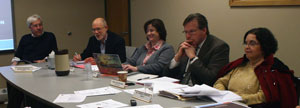
School Committee members discuss "data walls." - Photo by Andrew Firestone
Legality of data walls questioned by School Committee member
By Andrew Firestone
A dispute over posting of student test scores divided the School Committee last week and inspired heated discussions between parents and school administrators over possible damage the posting of scores might have on children’s self esteem, including reports of a young child who believed she was being told she was “stupid.”
Superintendent Anthony Pierantozzi said he opposed prohibiting the posting of scores. “I’m concerned that a prohibition of this will do more harm than the protection it wants to do,” said Pierantozzi, who addressed school committee concerns over the measure aided by Assistant Superintendent Dr. Vince McKay, and Senior Consultant from Focus On Results Dr. Janice Sonata “One of the problems of aggregate data in everyone, is that it’s less motivation for students individually who would be motivated by it, because it clouds the individual differences in growth.”
Ward Five School Committee member Mark Niedergang, opposed the displays and questioned their legality under privacy laws.
“The issue for me is, instead of ‘Focus on Results’, it seems ‘Focus on Testing,” he said. “By putting the individual test results on the wall, it creates the test as the end. That’s not what an education is in my mind, that’s not what I want for my kids.”
Focus On Results was brought to oversee the implementation of this framework in an effort to bridge the achievement gap found in Somerville schools. The educational framework involves using public displays of student test score improvement from the MCAS and other mandatory tests, along with individual student-teacher meetings with the scores to discuss areas of growth for the student. The “data walls” are part of the program, designed to give students an idea of where their place is within their class from grades two though eight.
Sonata, who had worked in various roles while implementing a similar framework in Glendale, California, said she had never before heard of this kind of complaint.
“We actually put up names. Kids wanted to know where they were,” she said. “We didn’t get any push back.”
Sonata said that the reasons for posting the individual scores was so students could more easily track their own progress, and feel united in their growth with the colleagues. “We saw the benefits of students being accountable and feeling responsible for their own learning,” she said.
Niedergang said the practice was a mistake if even a minority felt negative repercussions. “It’s clear the kids are finding out whose data is whose,” said Niedergang, “I don’t feel like that’s ok. That is not good for a learning community and I don’t want that in our schools.”
Ward Six School Committee member Paul Bockelman, who said he felt that the emphasis on test scores underlined a negative transition in educational values, joined Niedergang in opposition to the superintendent’s recommendation. “This elevates the focus on testing to a preeminent place,” he said.
Ward Three member Adam Sweeting said he saw potential in the measure in its ability to firmly place the impetus of learning upon the students by transparently including them in the process. “Nothing is better than when learners take control of it, so that education doesn’t happen to them, it’s something they will remark on as learners.”
Ward Two Committee member Teresa Cardoso said that even though she had reservations about the testing system, she was in favor of the displays and believed the potential harm negligent.
“I bet if you went into one of those classrooms and you sat with those 16 or 20 students and asked them, they wouldn’t have any problem with it,” she said. “They probably wouldn’t even know anything different was happening.”
“I’ve heard a lot more good than bad,” she said.
Pierantozzi said that due to the highly individualized methods that are used in the program, different classes will have different ways of displaying data. He said that the administration was quick to address any grievances that students might have such as an incident which had already occurred due to the data walls.
“That student felt that that student would be an outlier in a small group of individuals in that student’s class,” he said. “Conversation with the student and the principal, conversation with the student, the principal, the parent, myself; it was solved.”















Reader Comments